Federico Cassano
MMTEB: Massive Multilingual Text Embedding Benchmark
Feb 19, 2025Abstract:Text embeddings are typically evaluated on a limited set of tasks, which are constrained by language, domain, and task diversity. To address these limitations and provide a more comprehensive evaluation, we introduce the Massive Multilingual Text Embedding Benchmark (MMTEB) - a large-scale, community-driven expansion of MTEB, covering over 500 quality-controlled evaluation tasks across 250+ languages. MMTEB includes a diverse set of challenging, novel tasks such as instruction following, long-document retrieval, and code retrieval, representing the largest multilingual collection of evaluation tasks for embedding models to date. Using this collection, we develop several highly multilingual benchmarks, which we use to evaluate a representative set of models. We find that while large language models (LLMs) with billions of parameters can achieve state-of-the-art performance on certain language subsets and task categories, the best-performing publicly available model is multilingual-e5-large-instruct with only 560 million parameters. To facilitate accessibility and reduce computational cost, we introduce a novel downsampling method based on inter-task correlation, ensuring a diverse selection while preserving relative model rankings. Furthermore, we optimize tasks such as retrieval by sampling hard negatives, creating smaller but effective splits. These optimizations allow us to introduce benchmarks that drastically reduce computational demands. For instance, our newly introduced zero-shot English benchmark maintains a ranking order similar to the full-scale version but at a fraction of the computational cost.
PhD Knowledge Not Required: A Reasoning Challenge for Large Language Models
Feb 03, 2025



Abstract:Existing benchmarks for frontier models often test specialized, ``PhD-level'' knowledge that is difficult for non-experts to grasp. In contrast, we present a benchmark based on the NPR Sunday Puzzle Challenge that requires only general knowledge. Our benchmark is challenging for both humans and models, however correct solutions are easy to verify, and models' mistakes are easy to spot. Our work reveals capability gaps that are not evident in existing benchmarks: OpenAI o1 significantly outperforms other reasoning models that are on par on benchmarks that test specialized knowledge. Furthermore, our analysis of reasoning outputs uncovers new kinds of failures. DeepSeek R1, for instance, often concedes with ``I give up'' before providing an answer that it knows is wrong. R1 can also be remarkably ``uncertain'' in its output and in rare cases, it does not ``finish thinking,'' which suggests the need for an inference-time technique to ``wrap up'' before the context window limit is reached. We also quantify the effectiveness of reasoning longer with R1 and Gemini Thinking to identify the point beyond which more reasoning is unlikely to improve accuracy on our benchmark.
SelfCodeAlign: Self-Alignment for Code Generation
Oct 31, 2024



Abstract:Instruction tuning is a supervised fine-tuning approach that significantly improves the ability of large language models (LLMs) to follow human instructions. We propose SelfCodeAlign, the first fully transparent and permissive pipeline for self-aligning code LLMs without extensive human annotations or distillation. SelfCodeAlign employs the same base model for inference throughout the data generation process. It first extracts diverse coding concepts from high-quality seed snippets to generate new tasks. It then samples multiple responses per task, pairs each with test cases, and validates them in a sandbox environment. Finally, passing examples are selected for instruction tuning. In our primary experiments, we use SelfCodeAlign with CodeQwen1.5-7B to generate a dataset of 74k instruction-response pairs. Finetuning on this dataset leads to a model that achieves a 67.1 pass@1 on HumanEval+, surpassing CodeLlama-70B-Instruct despite being ten times smaller. Across all benchmarks, this finetuned model consistently outperforms the original version trained with OctoPack, the previous state-of-the-art method for instruction tuning without human annotations or distillation. Additionally, we show that SelfCodeAlign is effective across LLMs of various sizes, from 3B to 33B, and that the base models can benefit more from alignment with their own data distribution. We further validate each component's effectiveness in our pipeline, showing that SelfCodeAlign outperforms both direct distillation from GPT-4o and leading GPT-3.5-based distillation methods, such as OSS-Instruct and Evol-Instruct. SelfCodeAlign has also led to the creation of StarCoder2-Instruct, the first fully transparent, permissively licensed, and self-aligned code LLM that achieves state-of-the-art coding performance.
Planning In Natural Language Improves LLM Search For Code Generation
Sep 05, 2024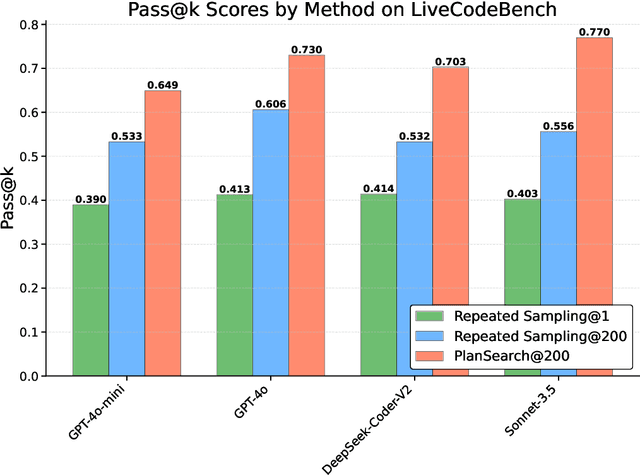
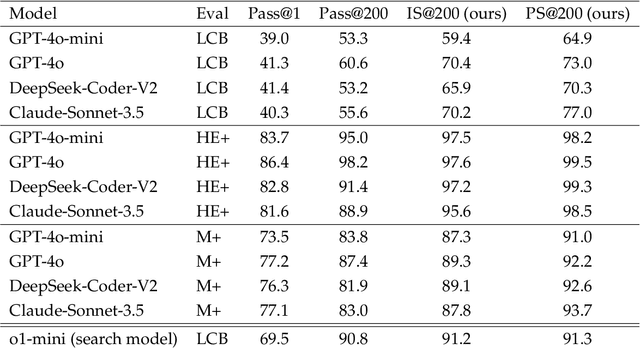
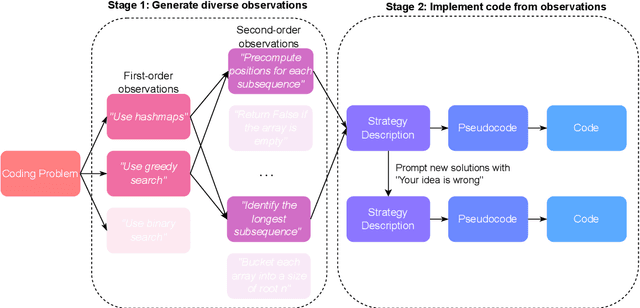
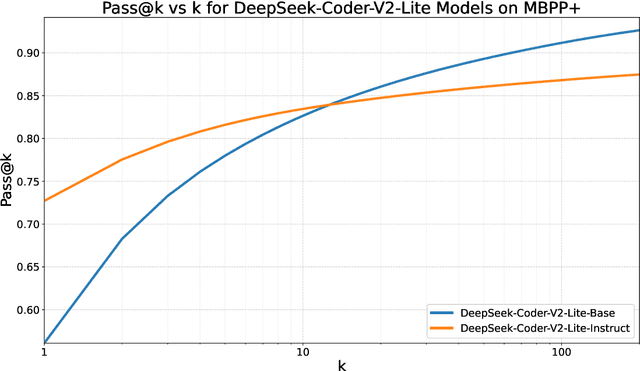
Abstract:While scaling training compute has led to remarkable improvements in large language models (LLMs), scaling inference compute has not yet yielded analogous gains. We hypothesize that a core missing component is a lack of diverse LLM outputs, leading to inefficient search due to models repeatedly sampling highly similar, yet incorrect generations. We empirically demonstrate that this lack of diversity can be mitigated by searching over candidate plans for solving a problem in natural language. Based on this insight, we propose PLANSEARCH, a novel search algorithm which shows strong results across HumanEval+, MBPP+, and LiveCodeBench (a contamination-free benchmark for competitive coding). PLANSEARCH generates a diverse set of observations about the problem and then uses these observations to construct plans for solving the problem. By searching over plans in natural language rather than directly over code solutions, PLANSEARCH explores a significantly more diverse range of potential solutions compared to baseline search methods. Using PLANSEARCH on top of Claude 3.5 Sonnet achieves a state-of-the-art pass@200 of 77.0% on LiveCodeBench, outperforming both the best score achieved without search (pass@1 = 41.4%) and using standard repeated sampling (pass@200 = 60.6%). Finally, we show that, across all models, search algorithms, and benchmarks analyzed, we can accurately predict performance gains due to search as a direct function of the diversity over generated ideas.
DafnyBench: A Benchmark for Formal Software Verification
Jun 12, 2024Abstract:We introduce DafnyBench, the largest benchmark of its kind for training and evaluating machine learning systems for formal software verification. We test the ability of LLMs such as GPT-4 and Claude 3 to auto-generate enough hints for the Dafny formal verification engine to successfully verify over 750 programs with about 53,000 lines of code. The best model and prompting scheme achieved 68% success rate, and we quantify how this rate improves when retrying with error message feedback and how it deteriorates with the amount of required code and hints. We hope that DafnyBench will enable rapid improvements from this baseline as LLMs and verification techniques grow in quality.
StarCoder 2 and The Stack v2: The Next Generation
Feb 29, 2024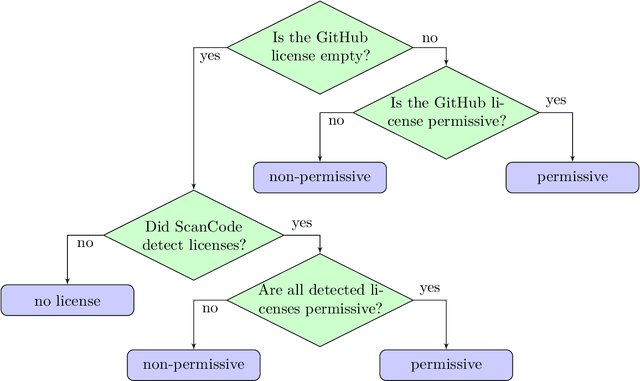
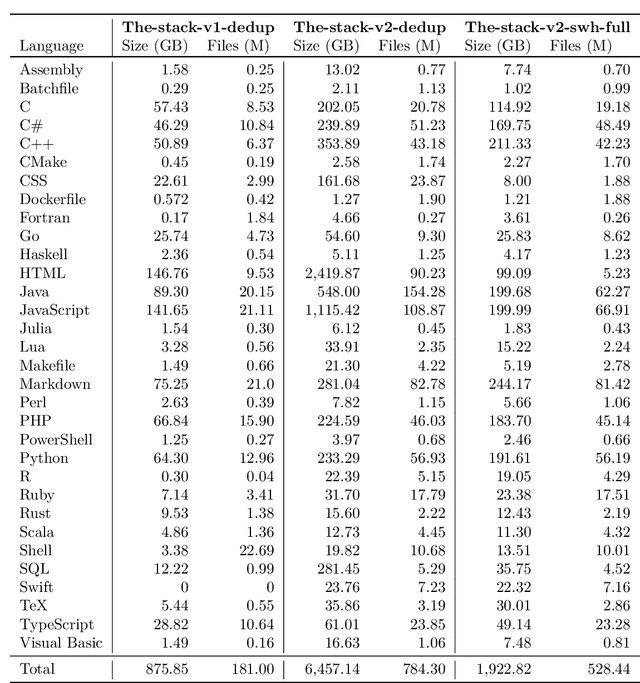
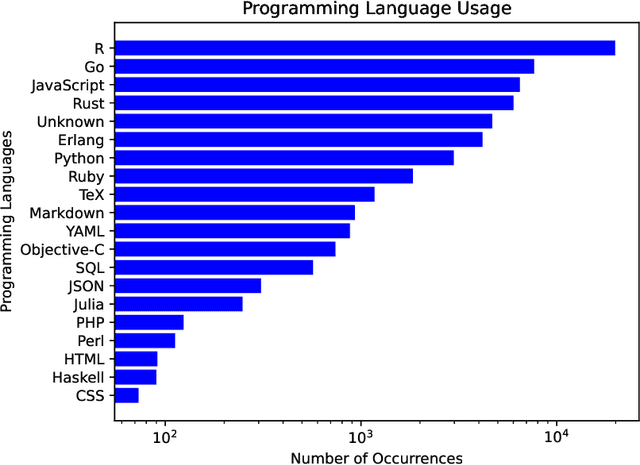
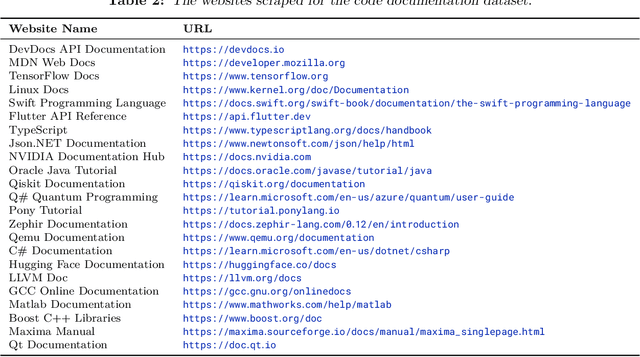
Abstract:The BigCode project, an open-scientific collaboration focused on the responsible development of Large Language Models for Code (Code LLMs), introduces StarCoder2. In partnership with Software Heritage (SWH), we build The Stack v2 on top of the digital commons of their source code archive. Alongside the SWH repositories spanning 619 programming languages, we carefully select other high-quality data sources, such as GitHub pull requests, Kaggle notebooks, and code documentation. This results in a training set that is 4x larger than the first StarCoder dataset. We train StarCoder2 models with 3B, 7B, and 15B parameters on 3.3 to 4.3 trillion tokens and thoroughly evaluate them on a comprehensive set of Code LLM benchmarks. We find that our small model, StarCoder2-3B, outperforms other Code LLMs of similar size on most benchmarks, and also outperforms StarCoderBase-15B. Our large model, StarCoder2- 15B, significantly outperforms other models of comparable size. In addition, it matches or outperforms CodeLlama-34B, a model more than twice its size. Although DeepSeekCoder- 33B is the best-performing model at code completion for high-resource languages, we find that StarCoder2-15B outperforms it on math and code reasoning benchmarks, as well as several low-resource languages. We make the model weights available under an OpenRAIL license and ensure full transparency regarding the training data by releasing the SoftWare Heritage persistent IDentifiers (SWHIDs) of the source code data.
Can It Edit? Evaluating the Ability of Large Language Models to Follow Code Editing Instructions
Dec 29, 2023Abstract:A significant amount of research is focused on developing and evaluating large language models for a variety of code synthesis tasks. These include synthesizing code from natural language instructions, synthesizing tests from code, and synthesizing explanations of code. In contrast, the behavior of instructional code editing with LLMs is understudied. These are tasks in which the model is instructed to update a block of code provided in a prompt. The editing instruction may ask for a feature to added or removed, describe a bug and ask for a fix, ask for a different kind of solution, or many other common code editing tasks. We introduce a carefully crafted benchmark of code editing tasks and use it evaluate several cutting edge LLMs. Our evaluation exposes a significant gap between the capabilities of state-of-the-art open and closed models. For example, even GPT-3.5-Turbo is 8.8% better than the best open model at editing code. We also introduce a new, carefully curated, permissively licensed training set of code edits coupled with natural language instructions. Using this training set, we show that we can fine-tune open Code LLMs to significantly improve their code editing capabilities.
Knowledge Transfer from High-Resource to Low-Resource Programming Languages for Code LLMs
Aug 22, 2023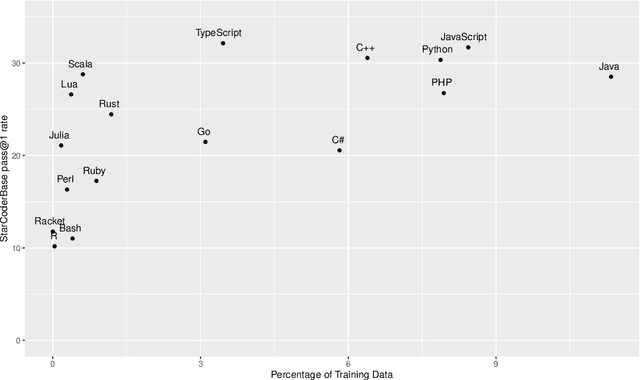
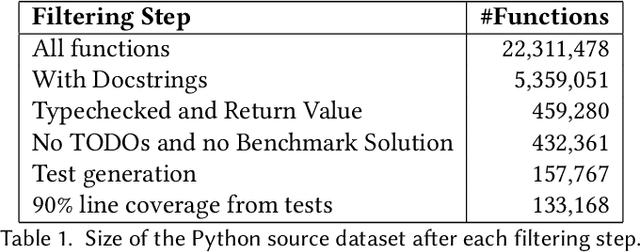
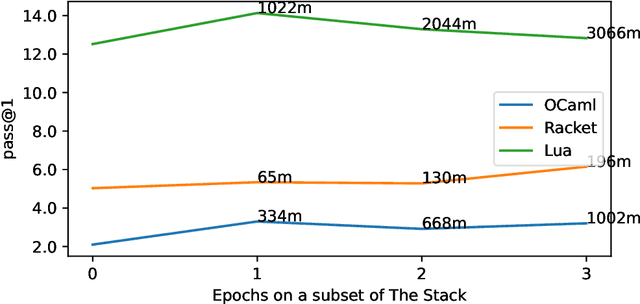
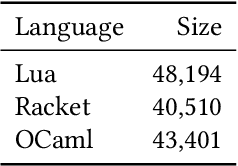
Abstract:Over the past few years, Large Language Models of Code (Code LLMs) have started to have a significant impact on programming practice. Code LLMs are also emerging as a building block for research in programming languages and software engineering. However, the quality of code produced by a Code LLM varies significantly by programming languages. Code LLMs produce impressive results on programming languages that are well represented in their training data (e.g., Java, Python, or JavaScript), but struggle with low-resource languages, like OCaml and Racket. This paper presents an effective approach for boosting the performance of Code LLMs on low-resource languages using semi-synthetic data. Our approach generates high-quality datasets for low-resource languages, which can then be used to fine-tune any pretrained Code LLM. Our approach, called MultiPL-T, translates training data from high-resource languages into training data for low-resource languages. We apply our approach to generate tens of thousands of new, validated training items for Racket, OCaml, and Lua from Python. Moreover, we use an open dataset (The Stack) and model (StarCoderBase), which allow us to decontaminate benchmarks and train models on this data without violating the model license. With MultiPL-T generated data, we present fine-tuned versions of StarCoderBase that achieve state-of-the-art performance for Racket, OCaml, and Lua on benchmark problems. For Lua, our fine-tuned model achieves the same performance as StarCoderBase as Python -- a very high-resource language -- on the MultiPL-E benchmarks. For Racket and OCaml, we double their performance on MultiPL-E, bringing their performance close to higher-resource languages such as Ruby and C#.
Type Prediction With Program Decomposition and Fill-in-the-Type Training
May 25, 2023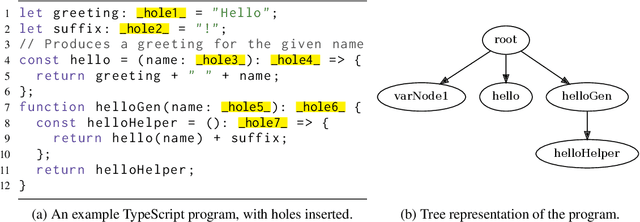

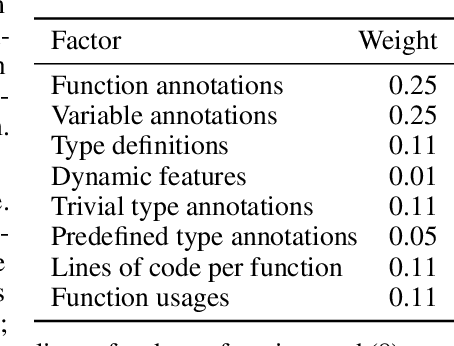
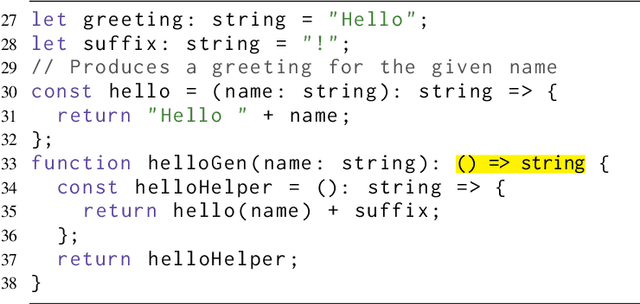
Abstract:TypeScript and Python are two programming languages that support optional type annotations, which are useful but tedious to introduce and maintain. This has motivated automated type prediction: given an untyped program, produce a well-typed output program. Large language models (LLMs) are promising for type prediction, but there are challenges: fill-in-the-middle performs poorly, programs may not fit into the context window, generated types may not type check, and it is difficult to measure how well-typed the output program is. We address these challenges by building OpenTau, a search-based approach for type prediction that leverages large language models. We propose a new metric for type prediction quality, give a tree-based program decomposition that searches a space of generated types, and present fill-in-the-type fine-tuning for LLMs. We evaluate our work with a new dataset for TypeScript type prediction, and show that 47.4% of files type check (14.5% absolute improvement) with an overall rate of 3.3 type errors per file. All code, data, and models are available at: https://github.com/GammaTauAI/opentau.
A Scalable and Extensible Approach to Benchmarking NL2Code for 18 Programming Languages
Aug 19, 2022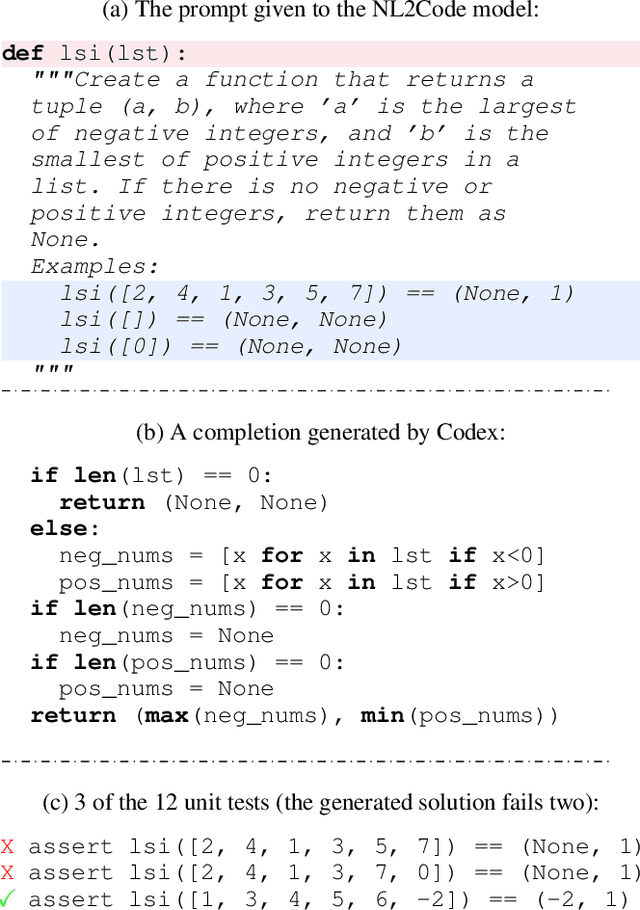
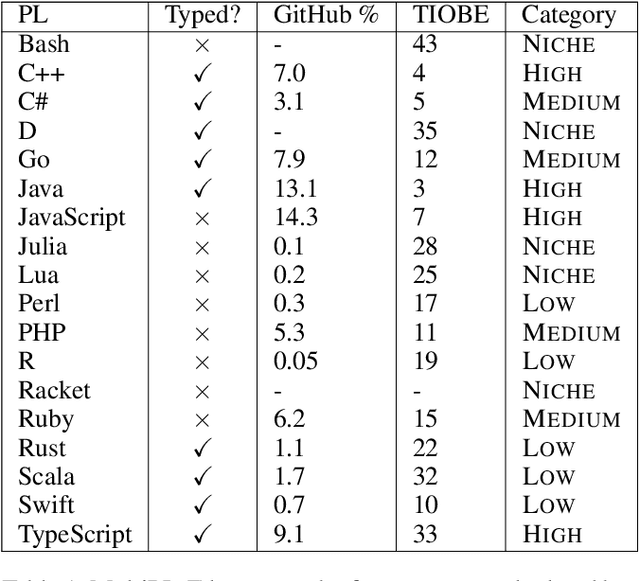
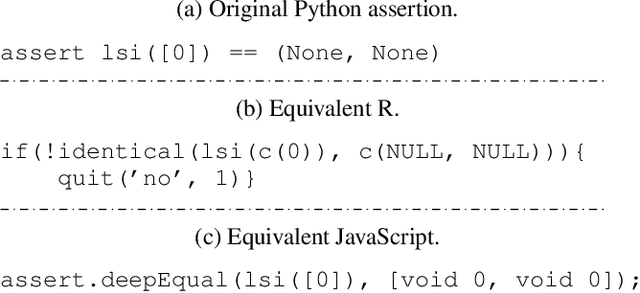
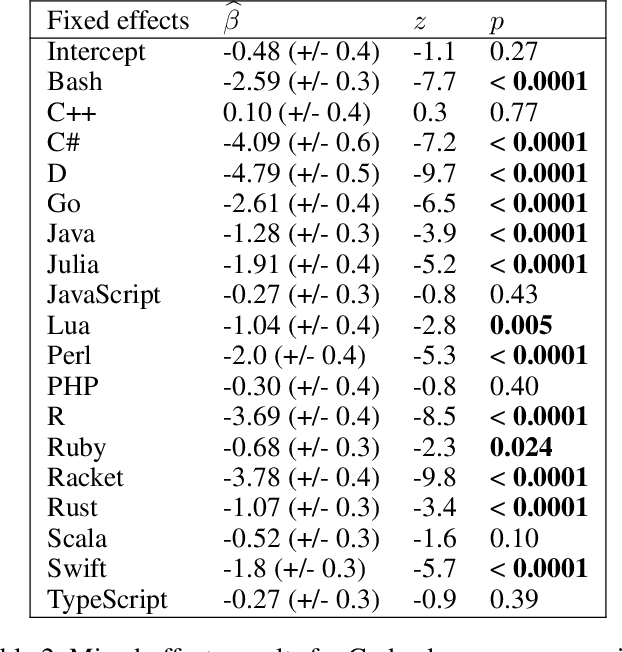
Abstract:Large language models have demonstrated the ability to condition on and generate both natural language and programming language text. Such models open up the possibility of multi-language code generation: could code generation models generalize knowledge from one language to another? Although contemporary code generation models can generate semantically correct Python code, little is known about their abilities with other languages. We facilitate the exploration of this topic by proposing MultiPL-E, the first multi-language parallel benchmark for natural-language-to-code-generation. MultiPL-E extends the HumanEval benchmark (Chen et al, 2021) to support 18 more programming languages, encompassing a range of programming paradigms and popularity. We evaluate two state-of-the-art code generation models on MultiPL-E: Codex and InCoder. We find that on several languages, Codex matches and even exceeds its performance on Python. The range of programming languages represented in MultiPL-E allow us to explore the impact of language frequency and language features on model performance. Finally, the MultiPL-E approach of compiling code generation benchmarks to new programming languages is both scalable and extensible. We describe a general approach for easily adding support for new benchmarks and languages to MultiPL-E.
 Add to Chrome
Add to Chrome Add to Firefox
Add to Firefox Add to Edge
Add to Edge